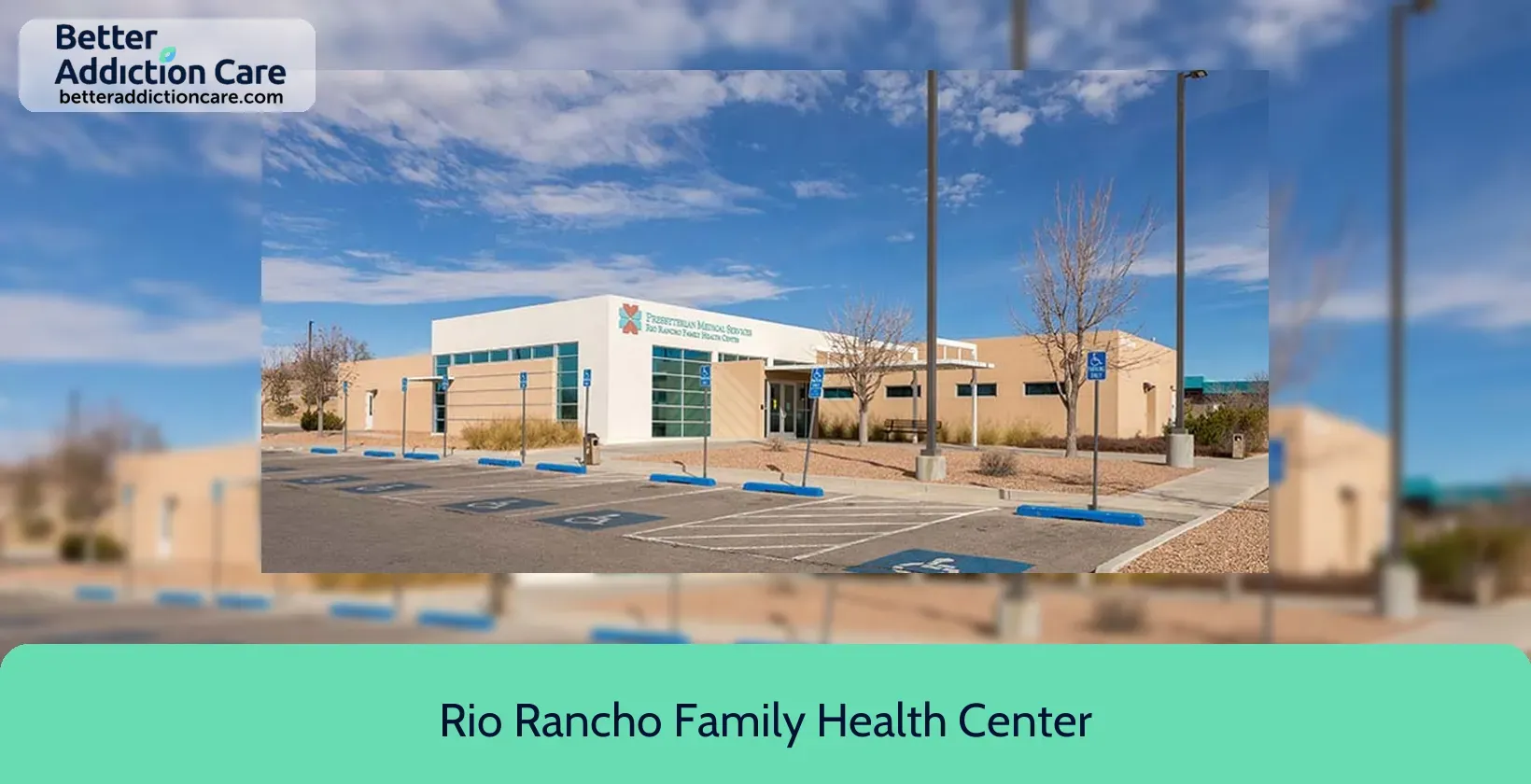Rio Rancho Health Services

Overview
Rio Rancho Health Services is an accredited substance abuse treatment center that provides outpatient detoxification, for men between 18 and 65+ years of age. As part of their special programs, Rio Rancho Health Services treats clients with co-occurring mental and substance use disorders, veterans, and active duty military. To help patients achieve sobriety, Rio Rancho Health Services provides treats benzodiazepines detoxification, methamphetamines detoxification, and opioids detoxification.. Afterward, patients receive substance use disorder counseling, family counseling, and marital/couples counseling during treatment. Rio Rancho Health Services is located in Rio Rancho, New Mexico, providing treatment for people in Sandoval County, accepting cash or self-payment, medicaid, and federal, or any government funding for substance use treatment programs.
Rio Rancho Health Services at a Glance
Payment Options
- Cash or self-payment
- Medicaid
- Federal, or any government funding for substance use treatment programs
Assessments
- Comprehensive substance use assessment
- Outreach to persons in the community
- Screening for mental disorders
- Screening for substance use
Age Groups
- Seniors or older adults
- Young adults
- Adults
- Seniors
Ancillary Services
- Case management service
- Mental health services
- Social skills development
- Opioid use disorder clients only
Highlights About Rio Rancho Health Services
7.01/10
With an overall rating of 7.01/10, this facility has following balanced range of services. Alcohol Rehabilitation: 8.00/10, Drug Rehab and Detox: 7.54/10, Insurance and Payments: 6.00/10, Treatment Options: 6.49/10.-
Alcohol Rehabilitation 8.00
-
Drug Rehab and Detox 7.54
-
Treatment Options 6.49
-
Insurance and Payments 6.00
Accreditations
State mental health department:
State mental health department accreditation refers to the process of evaluating and certifying the quality and standards of a state's mental health department, ensuring that it provides high-quality services and meets specific criteria for mental health care. The accreditation process is performed by a third-party organization and helps to improve the overall care and treatment of individuals with mental health conditions.
State department of health:

Government agencies issue State Licenses, granting rehabilitation organizations permission to operate their businesses legally within specific geographic regions. The licenses needed for legal operation are typically determined by the type of rehabilitation program offered by a facility and its physical location.
Council on Accreditation (COA):
The Council on Accreditation (COA) is a non-profit that provides accreditation to human services organizations to ensure they meet high standards in service delivery. The accreditation process involves evaluating the organization's policies, practices, and services to meet specific standards.
Treatment At Rio Rancho Health Services
Treatment Conditions
- Substance use treatment
Care Levels
- Outpatient
- Outpatient detoxification
- Outpatient methadone/buprenorphine or naltrexone treatment
- Regular outpatient treatment
Treatment Modalities
- Substance use disorder counseling
- Family counseling
- Marital/couples counseling
- Treatment for other addiction disorder
- Individual psychotherapy
Ancillary Services
Languages
- Spanish
Additional Services
- Pharmacotherapies administered during treatment
- Mentoring/peer support
- Drug or alcohol urine screening
Special Programs
- Clients with co-occurring mental and substance use disorders
- Veterans
- Active duty military
- Members of military families
- Criminal justice (other than DUI/DWI)/Forensic clients
Get Help Now
Common Questions About Rio Rancho Health Services
Contact Information
Other Facilities in Rio Rancho

7.42

6.65

6.96
Browse rehab centers near Rio Rancho and in other cities across New Mexico
DISCLAIMER: The facility name, logo and brand are the property and registered trademarks of Five Sandoval Indian Pueblos - Behavioral Health Services Program, and are being used for identification and informational purposes only. Use of these names, logos and brands shall not imply endorsement. BetterAddictionCare.com is not affiliated with or sponsored by Five Sandoval Indian Pueblos - Behavioral Health Services Program.
